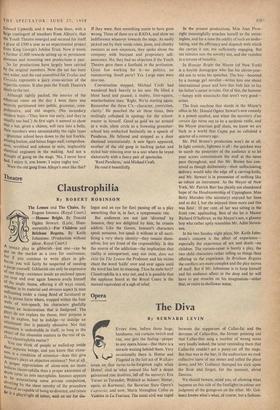Theatre
Claustrophilia
By ROBERT ROBINSON The Lesson and The Chairs. By Eugene Ionesco. (Royal Court.) —Honour Bright. By Donald Ogden Stewart. (Lyric, Ham- mersmith.)—For Children and Brixham Regatta. By Keith Johnstone. (Production without decor, Royal Court.) A SINGLE play in gibberish—just one—can be Put on the market as a cure for costiveness; but i you continue to write plays in gib- erish you will fairly be suspected of needing a Purge yourself. Gibberish can only be expressive of one thing—existence inside an enclosed space; Yet over and over again Ionesco avails himself of the single theme, offering it all ways round, whether in its material and obvious aspect (a man suffocating under a rising flood of furniture) or 1° its Purest form where, trapped within the four Walls of non-speech, his characters gleefully endure an incarceration that is foolproof. The Plays do not explore the theme, their purpose is not to' explore, but to indulge—to indulge an attachment that is patently obsessive. Not that obsession is undesirable in itself, so long as the object of the obsession matters to the rest of us. .uoes claustrophilia matter? A SINGLE play in gibberish—just one—can be Put on the market as a cure for costiveness; but i you continue to write plays in gib- erish you will fairly be suspected of needing a Purge yourself. Gibberish can only be expressive of one thing—existence inside an enclosed space; Yet over and over again Ionesco avails himself of the single theme, offering it all ways round, whether in its material and obvious aspect (a man suffocating under a rising flood of furniture) or 1° its Purest form where, trapped within the four Walls of non-speech, his characters gleefully endure an incarceration that is foolproof. The Plays do not explore the theme, their purpose is not to' explore, but to indulge—to indulge an attachment that is patently obsessive. Not that obsession is undesirable in itself, so long as the object of the obsession matters to the rest of us. .uoes claustrophilia matter? _ You can think of people as walled-up inside their separate beings, and you know that alone- ness is a condition of existence—does this give 1°fleseo's plays an objective existence? Not at all. ,„ .Proper appreciation of alone-ness no more induces claustrophilia than a proper awareness of a. eath turns us into necrophiles. Ionesco appears to be externalising some private compulsion, divertingr by the sheer novelty of the procedure ,....11° is of us capable of being so diverted, and (since "c s a playwright of talent, with an ear for dia- logue and an eye for fun) passing off as a play something that is, in fact, a symptomatic rite.
But audiences are not just 'diverted' by Ionesco, they are delighted by him, he creates addicts. Like the Goons, Ionesco's characters speak nonsense, but speak it without at all sacri- ficing a very sharp identity—they remain them- selves, but are freed of the responsibility. Is this the source of the addiction—the implication that reality is unimportant, may not exist, does not exist (in The Lesson the Professor and his victim chant the word 'knife' over and over again until the word has lost its meaning. Then he stabs her)? Claustrophilia is a way out, and it is possible that the applause heard at the Royal Court is the manual equivalent of a sigh of relief. In the present productions, Miss Joan Plow- right meaningfully attaches herself to the mean- ingless, and for a time the oddity of such an under- taking, and the efficiency and dispatch with which she carries it out, are sufficiently engaging. But ten minutes sees the novelty out, and she vanishes in a torrent of banality.
In Honour Bright the Mayor (of New York) is a. boyish demagogue who has his eleven-year- old son to write his speeches. The boy—besotted by a teenage girl novelist—writes him one about international peace and love that bids fair to lay his father's career in ruins. Out of this, the humour —lumpy with wisecracks that aren't very good— arises.
The fruit machine that stands in the Mayor's office in Mr. Donald Ogden Stewart's new comedy is a potent symbol, and when the secretary d'un certain dge turns out to be a sardonic rattle, and the Mayor practises golf shots, we know we are back in a world that Capra put on celluloid a quarter of a century ago.
Mr. Phil Brown's production won't do at all. In light comedy, lightness is all : the quickest way to numb the posteriors of the audience is to let your actors communicate the stuff at the same pace throughout, and this Mr. Brown has con- trived as though deliberately—their unfluctuating delivery would take the edge off a carving-knife, and Mr. Stewart is in possession of nothing like so robust an instrument. As the Mayor of New York, Mr. Patrick Barr has plainly not abandoned hope of the Headmastership of Uppingham. Miss Betty Marsden (the secretary) enjoyed her lines and so did I, but she enjoyed them more and this was fatal : 10 per cent. of her was sitting in the front row, applauding. Best of the lot is Master Richard O'Sullivan, as the Mayor's son, a gloomy boy who rather aptly resembles Mr. Adlai Steven- son.
In his two Sunday night plays, Mr. Keith John- stone's concern is the effect of experience— especially the experience of sex and death—on children. The curtain-raiser is barely a play, the two child characters rather telling us things than offering us the experience. In Brixham Regatta the conflicts are more complex and the play moves of itself. But if Mr. Johnstone is to keep himself and his audience afloat in the deep end he will have to put muscles on his imagination—either that, or retire to shallower water. ,


































 Previous page
Previous page